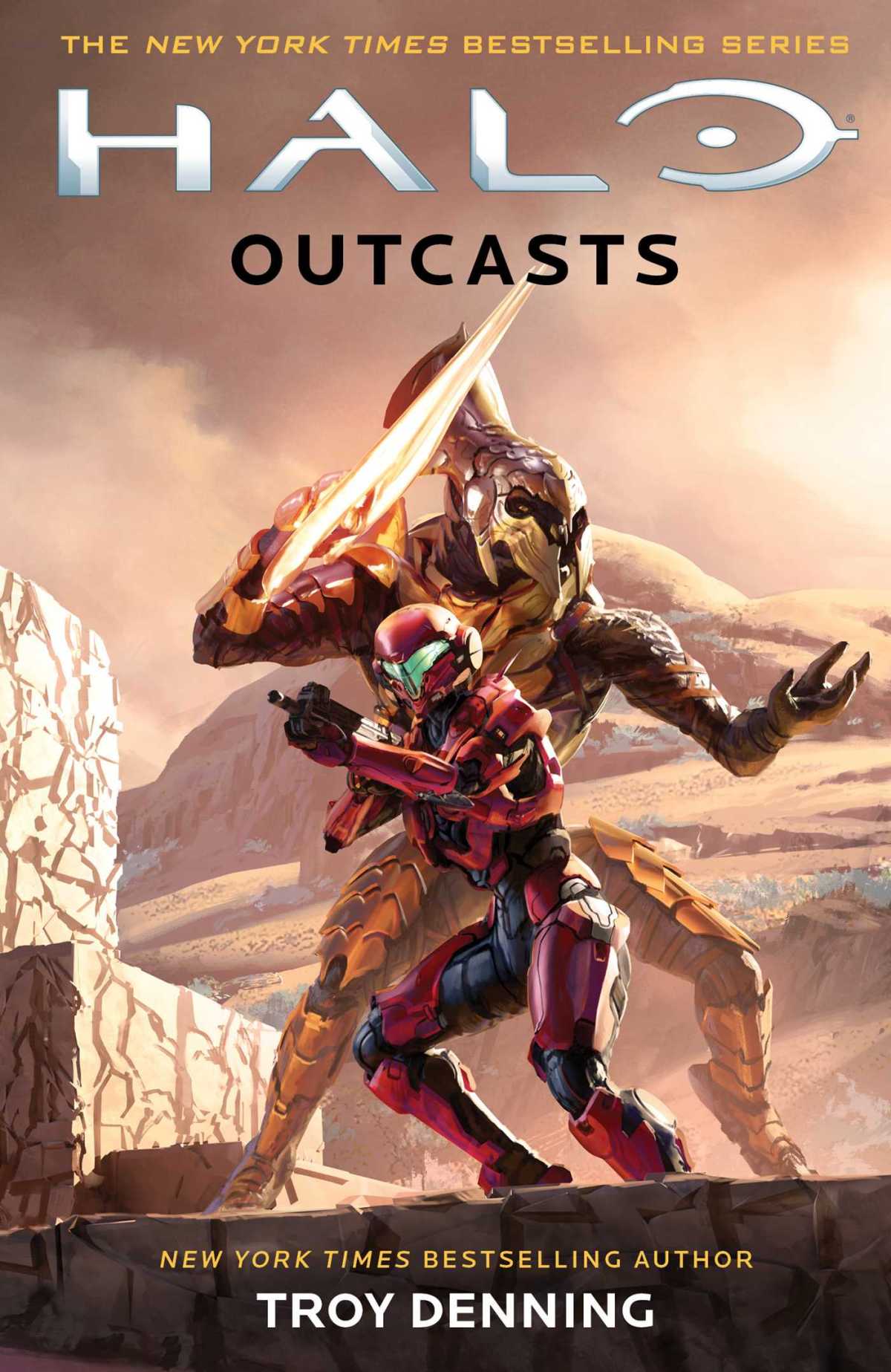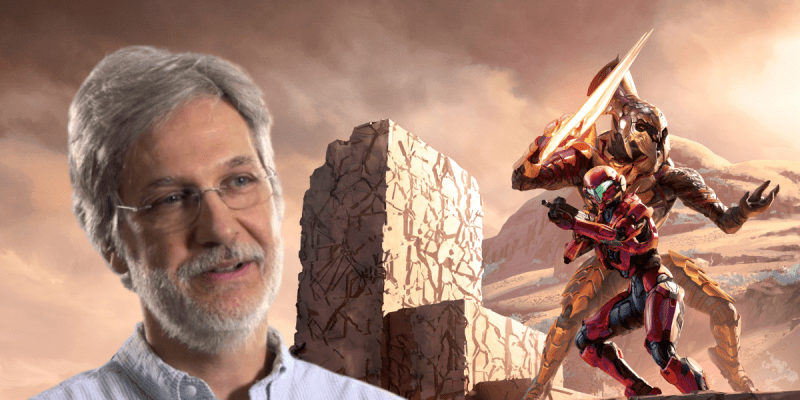Author Troy Denning returns to the Halo universe with Halo: Outcasts, a new novel set in 2559 featuring the Arbiter and Spartan Vale. When Arbiter Thel ‘Vadam sees an opportunity to rid the Sangheili citizens of Cortana’s oppression, he acts — but his secrecy causes Olympia Vale, his UNSC ally, to question his motives and suspect him. Neither Vale nor the Arbiter realizes that they are being manipulated, and their actions could lead them to destroy each other. Before Halo: Outcasts releases this month, we spoke with Troy Denning, who was kind enough to sit down with The Escapist to discuss his newest novel in an interview. You can read each of his responses below.
The Escapist: You’re a veteran of the Halo universe, having written the Ferrets series and the “Master Chief Story” series, as well as a short story in Halo: Fractures. What about the universe and characters keeps you wanting to revisit Halo?
Troy Denning: I’m a big fan of both military fiction and science fiction, so any universe that combines the two is a real draw for me. I was also drawn to Halo by how the universe reveals itself like an onion. Every time you think you have a grasp on what or who is driving the narrative, 343 peels back another layer and shows you the story in a whole new light.
What keeps me coming back to Halo is the narrative team’s willingness to let outside contributors peel back their own layers. Most IPs I’ve worked with have clear parameters which freelancers are not allowed to push up against. But 343’s attitude has always been, “Tell us what you want to do, and we’ll find a way.” That’s very liberating.

We saw Spartan Olympia Vale as part of Fireteam Osiris in Halo 5, and she plays a central role in Halo: Outcasts. How do you see her journey, and what should fans know coming into Outcasts?
Troy Denning: Vale is a classic overachiever. The first time I saw her was in Peter David’s Hunters in the Dark, where her intellectual credentials and combat competency are established as the cultural liaison on a joint Sangheili / human mission to the Ark. A few real-life months later, Halo 5 releases and we learn that she has become a Spartan. Obviously, this is a character who relishes a challenge, but it wasn’t until I began to do in-depth backstory research for Outcasts that I found the key to my own interpretation of her character.
Vale is someone who thrives under extreme adversity. And that’s the kind of person who is disciplined, iron-willed, and — most importantly — a strategic, clear-headed thinker. So those are the strengths I tried to build into my interpretation of her character.
I hear from fans of the games who are hesitant to jump into the Halo books because of the sheer volume of them at this point, but I feel like Outcasts would be just as rewarding and enjoyable to a fan who’s only played the games. How do you try to balance making the book accessible to someone new to the series while also respecting hardcore fans?
Troy Denning: Fans should never be afraid to jump into a universe because it generates a lot of lore. That’s just a sign of its popularity—all those stories wouldn’t be out there if people didn’t enjoy what they’re seeing. More importantly, it’s not an assignment. There’s no rule that says you have to read it all, much less know it all. I check out stories in a lot of different universes because I’m always looking for something new to read. If the first book keeps me interested, then I read the second; if that one holds my attention, then I move on to the next one. I keep doing that until it stops being fun or I’ve exhausted the supply. And if I’m really drawn into a universe, sometimes I’ll check into writing for it.
Halo: Outcasts isn’t just a catchy title. Many of the characters in the story are outcasts themselves in different ways, and many of them have to face their own past while finding their place now. What was appealing about that theme in Halo: Outcasts?
Troy Denning: I’ve known that I wanted to return to Netherop since stranding two implacable enemies, Nizat ‘Kvarosee and Amalea Petrov, there at the end of Halo: Oblivion with small groups of subordinates. It was a dramatic setup just waiting to be explored in another story. But it needed an engaging hook – a story about a decades-long battle between a handful of Sangheili warriors and an equally small unit of UNSC soldiers just wasn’t big enough to justify a major novel release. So, when 343 said they wanted me to do a team-up book between Olympia Vale and the Arbiter, that’s where my head went, and we began exploring plots related to Cortana and the Created and what was happening with Infinite at the time. And, of course, it’s not hard to find a big enough story there.
I was also curious about the nature of the catastrophe that had wiped out Netherop’s original civilization, and the fate of the young castaways whose ancestors had been marooned there, and whom Blue Team rescued in Oblivion. So I wanted to find a way to weave all that into the story. As is usually the case when you try to join so many disparate elements, it took a fair amount of hair-pulling and head-scratching to come up with a plot that brought them all into the story naturally. But every time I thought about returning to Netherop without one of those original elements, it felt like something was missing. So we kept trying and finally developed a story that did what we wanted it to.

What’s your favorite thing about writing the Arbiter?
Troy Denning: His backstory. The games have done a wonderful job of developing a complex, engaging, and sympathetic character. So being given a chance to carry his story forward in Outcasts was a real privilege. As a Sangheili warrior, he follows a pretty strict code of warfare that his allies in the Covenant did not always share, and I think that’s what planted the seed to make his switch of loyalties so believable. You could always see, even when he was attacking human worlds, a certain distaste and uneasiness with the treachery that came so easily to his Covenant allies. So when he finally learns the depths of the San‘Shyuum deception — and experiences the ruthlessness of the Jiralhanae betrayal — it feels very natural for him to switch sides and help stop the Halo Array from firing. What else could an honorable warrior do?
In Outcasts, I tried to build on those character strengths and show how they manifest in his alliance with the humans. For instance, he is well aware of how treacherous humans can be — especially ONI — and so he is very careful about trusting them. But he has built a strong personal relationship with Vale, and he trusts her almost as much as he does his own warriors. That was a wonderful dynamic to play with, especially as their conflicting interests put them at loggerheads.
You have written books in other franchises before — Star Wars, for one. What are the additional challenges when you take on an established world or universe, and does it change what you try to accomplish with a story?
Troy Denning: The biggest challenge is that you really do need to know the existing lore fairly well. Every property has a staff of in-house editors whose job it is to protect continuity, and they are invaluable resources for helping you develop ideas that work and avoid doing dumb things that don’t. But until you’re at least a minor expert yourself, you don’t really see the opportunities to add new wrinkles that excite fans and really impact the universe. That takes time and effort. It’s one of the reasons I don’t like to property-hop. Until I’ve read twenty books and written three or four of my own in a property, I don’t feel like I really understand it well enough to add something that’s going to impact the universe in a meaningful way. You can’t afford to make that kind of commitment to a property unless you intend to work in it for a few years.
Probably the second biggest challenge is that you’re part of an overarching publishing program that you don’t really understand. The editors will suggest a book idea that includes anywhere from one to a couple of dozen plot points, and you have no idea which ones are a reflection of the super-secret project they’re working on and which ones they just think are cool ideas. So, when you’re designing the story, you don’t know which points you can throw away and which ones are essential. That’s another advantage of working in the same property for a number of years. You develop relationships where you can just drop an email explaining the problem, and the editors will be happy to tell you what’s what. The 343 editors are especially good about this — it’s another reason I love working with them.
Halo: Outcasts, the newest novel in the Halo universe, is available August 8, 2023. This interview with Troy Denning for Halo: Outcasts has been edited for clarity.
